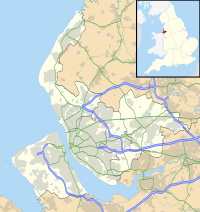Toxteth Unitarian Chapel
| Toxteth Unitarian Chapel | |
|---|---|

Old school house and chapel beyond
|
|
| Coordinates: 53°22′53″N 2°57′29″W / 53.3813°N 2.9580°W | |
| OS grid reference | SJ 363 875 |
| Location | Dingle, Liverpool, Merseyside |
| Country | England |
| Denomination | Unitarian |
| Architecture | |
| Functional status | Active |
| Heritage designation | Grade I |
| Designated | 28 June 1952 |
| Architectural type | Chapel |
| Groundbreaking | 1618 |
| Completed | 1774 |
| Specifications | |
| Materials | Stone with slate roof |
Toxteth Unitarian Chapel is in Park Road, Dingle, Liverpool, Merseyside, England. Since the 1830s it has been known as The Ancient Chapel of Toxteth. It is recorded in the National Heritage List for England as a designated Grade I listed building. and continues to be in use as a Unitarian chapel. It is a member of the General Assembly of Unitarian and Free Christian Churches, the umbrella organisation for British Unitarians.
In 1611 a group of Puritan farmers built a school in Toxteth and appointed Richard Mather, at the age of 15, as its master. He then went to Brasenose College, Oxford to continue his education but he was asked to return to Toxteth. By this time the chapel had been built and on 30 November 1618 he preached his first sermon. He subsequently became ordained in the Church of England. However he was suspended from the ministry in 1633 and again in 1634 because of his nonconfomist preaching, and in 1635 he emigrated to America. By 1662 the minister of the chapel was a Presbyterian named Thomas Crompton and he was joined by another dissenter, Michael Briscoe. In 1672 both ministers obtained licences under the Royal Declaration of Indulgence and the chapel was enlarged to accommodate dissenters from central Liverpool. However as more chapels were built, Toxteth chapel was neglected and fell into disrepair. In 1774 it was partly rebuilt. Around this time the majority of the congregation were Unitarian and the others left to form a new congregation. A porch was added in 1841. Unitarian services continue to be held in the chapel every fortnight.
...
Wikipedia

